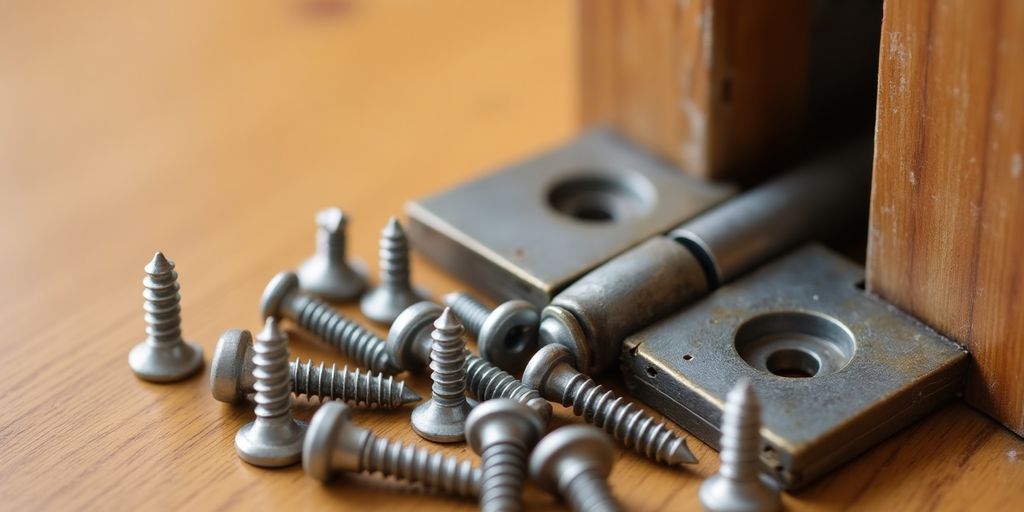
What Size Screw for Door Hinge: A Comprehensive Guide to Choosing the Right Fasteners
When it comes to installing door hinges, selecting the right size screw is essential. The correct screws not only keep the hinges secure but also ensure the door operates smoothly and safely. This guide will help you understand various factors that influence screw size, the materials you should consider, and best practices for installation. By following these guidelines, you can make informed decisions about what size screw for door hinge applications, ensuring durability and functionality.
Key Takeaways
- Choosing the right screw size is crucial for door hinge stability.
- Common screw sizes for door hinges include #8 and #10 gauges.
- Use screws made from durable materials like stainless steel for better longevity.
- Pre-drilling holes helps ensure a secure fit for screws.
- Regularly check and replace worn screws to maintain door functionality.
Understanding Screw Sizes for Door Hinges
When it comes to door hinges, selecting the right screw size is essential for ensuring stability and proper function. Using the correct screws helps secure the hinges firmly to the door and frame. Here are some key factors to consider:
Factors Influencing Screw Size
- Door Thickness: Thicker doors may require longer screws.
- Hinge Type: Different hinges may need specific screw sizes.
- Weight of the Door: Heavier doors typically need larger screws for support.
Common Screw Sizes for Door Hinges
| Screw Gauge | Diameter (mm) | Common Use |
|---|---|---|
| #6 | 3.5 | Light doors |
| #8 | 3.8 | Standard doors |
| #10 | 4.2 | Heavy doors |
Impact of Screw Size on Door Functionality
- Stability: Proper screw size ensures that hinges remain secure.
- Performance: Incorrect sizes can lead to loose hinges and misalignment.
- Longevity: Using the right screws can prevent wear and tear over time.
Choosing the right screw size is not just about fitting; it’s about ensuring the door functions correctly and lasts longer. For example, the wrs 3" aluminum screen door hinge with brass bearings is designed to enhance functionality and appearance, making it a great choice for both residential and commercial use.
Materials and Types of Screws for Door Hinges
When selecting screws for door hinges, it’s important to consider the material and type of screw that will best suit your needs. Choosing the right material can significantly affect the durability and performance of your door hinges. Here are some key points to keep in mind:
Choosing the Right Material
- Stainless Steel: Highly resistant to rust and corrosion, making it ideal for exterior doors.
- Brass: Offers a decorative finish and is also resistant to corrosion, suitable for indoor use.
- Hardened Steel: Provides strength and durability, often used for heavy-duty applications.
Types of Screws for Different Door Hinges
| Type of Screw | Description |
|---|---|
| Wood Screws | Designed for wooden doors and frames. |
| Machine Screws | Used for metal hinges and frames. |
| Self-tapping Screws | Create their own hole, ideal for quick installations. |
Corrosion Resistance and Durability
- Coated Screws: Some screws come with a protective coating to enhance corrosion resistance.
- Quality Matters: Always opt for screws from reputable manufacturers to ensure longevity and reliability.
Selecting the right screws not only ensures a secure fit but also enhances the overall functionality of your door hinges.
In summary, understanding the materials and types of screws available is crucial for effective door hinge installation. By choosing the right screws, you can ensure that your door operates smoothly and lasts for years to come. For example, the wrs 3" standard garage door hinge with fasteners is designed for durability and smooth operation, making it a great choice for both residential and commercial use.
Installation Best Practices for Door Hinge Screws
Pre-drilling and Pilot Holes
To ensure a smooth installation, always pre-drill holes before inserting screws. This helps prevent the wood from cracking or splitting. Here are some steps to follow:
- Measure and mark the spot where the screw will go.
- Use a drill bit that is slightly smaller than the screw diameter.
- Drill to the appropriate depth, usually about the length of the screw.
Using Power Tools vs Manual Installation
When installing screws, you can choose between power tools and manual methods. Power tools can speed up the process, but using a manual screwdriver allows for better control. Here are some tips:
- Avoid overtightening screws, as this can strip the holes.
- Use a power drill for initial insertion, then switch to a manual screwdriver for the final tightening.
- Always check that the screw heads are flush with the hinge to ensure a snug fit.
Ensuring a Secure Fit
A secure fit is crucial for the functionality of the door. Here’s how to ensure that:
- Make sure the screw heads sit flush within the hinge slots without any gaps.
- Check for any wobbling or movement after installation.
- If the screws feel loose, consider using longer screws or filling the holes with wood filler to create a tighter fit.
Proper installation of door hinge screws is essential for maintaining the door's functionality and longevity. Always follow best practices to avoid common issues.
Summary Table of Installation Tips
| Tip | Description |
|---|---|
| Pre-drill Holes | Prevents cracking and ensures smooth installation |
| Use Manual Tools | Provides better control over screw tightness |
| Check for Secure Fit | Ensures hinges function properly |
Special Considerations for Fire Door Hinges

When it comes to fire door hinges, there are specific requirements that must be followed to ensure safety and compliance. Using the right screws is crucial for maintaining the integrity of fire doors. Here are some important points to consider:
Fire Door Requirements and Standards
- Material and Construction: Fire doors must be made from fire-resistant materials to withstand high temperatures.
- Certification: They need to meet standards set by recognized authorities.
- Closers and Seals: Fire doors should have self-closing devices and seals that expand when heated.
Recommended Screw Sizes for Fire Doors
| Screw Gauge | Diameter | Common Use |
|---|---|---|
| #6 | 3.5mm | Not preferred for fire doors |
| #8 | 3.8mm | Most common for standard doors |
| #10 | 4.2mm | For heavy doors |
Ensuring Compliance with Safety Regulations
- Regular Maintenance: Inspect fire doors regularly to ensure they function correctly.
- Proper Installation: Follow guidelines for screw size and hinge positioning to avoid issues.
- Use Quality Materials: Ensure screws match the hinge material, like stainless steel for durability.
Proper installation of screws for fire door hinges is essential for safety and compliance. Regular checks can prevent issues and ensure longevity.
Troubleshooting Common Issues with Door Hinge Screws
Identifying Stripped Screw Holes
Stripped screw holes can happen when screws are tightened too much or if the screws are old. To fix this issue, you can fill the holes with matchsticks or wooden dowels and then reposition the hinge slightly. This will help the screws grip better and hold the hinge in place.
Solutions for Misaligned Hinges
Misaligned hinges can cause doors to bind or not close properly. If you notice this, try using longer or thicker screws to adjust the fit. If the problem is severe, you may need to replace the damaged hinges altogether.
Replacing Worn Out Screws
Worn out screws can be identified by rust, bending, or a loose fit. It's important to replace these screws with new ones that meet the specifications for your door hinges. For example, using heavy-duty galvanized steel screws can enhance durability and performance.
Regularly checking and maintaining your door hinge screws is essential for ensuring the longevity and functionality of your doors.
Summary of Common Issues
Here’s a quick list of common issues and their solutions:
- Stripped screw holes: Fill with matchsticks and reposition.
- Misaligned hinges: Use longer screws or replace hinges.
- Worn out screws: Replace with new, suitable screws.
Choosing Quality Screws and Suppliers

When it comes to selecting screws for door hinges, quality matters. Choosing the right screws ensures that your doors function properly and last longer. Here are some key points to consider:
Importance of Quality Screws
- Durability: High-quality screws resist wear and tear, ensuring they hold up over time.
- Rust Resistance: Screws made from corrosion-resistant materials like stainless steel are ideal for humid environments.
- Easy Installation: Well-made screws with sharp threads make installation smoother and quicker.
Selecting Reputable Manufacturers
When sourcing screws, consider these factors:
- Reputation: Look for manufacturers known for producing high-quality screws.
- Material Quality: Ensure screws are made from durable materials like stainless steel or brass.
- Certification: Check for quality certifications like ISO or ANSI/ASME standards.
- Product Range: Choose suppliers that offer a variety of screw sizes and types.
- Customer Support: Opt for suppliers that provide excellent support and assistance.
Evaluating Supplier Options
To find the best supplier, consider:
- Customer Reviews: Look for feedback from other customers.
- Pricing: Compare prices to ensure you’re getting a good deal.
- Delivery Times: Check how quickly they can fulfill orders.
Choosing high-quality screws from trusted suppliers can make a significant difference in the performance and longevity of your door hinges.
In summary, investing in quality screws and selecting reputable suppliers will ensure that your door hinges are secure and functional for years to come. For example, the wrs 3-inch steel pivot bar with screw is designed for durability and compatibility with a #6 screw size, making it a reliable choice for your projects.
Final Thoughts on Choosing the Right Screw Size for Door Hinges
In conclusion, selecting the right size screws for your door hinges is essential for ensuring that your doors function properly and safely. Using the correct screws helps keep the hinges secure, which is important for the overall stability of the door. Remember to consider the type of door and hinge you have, as well as the materials involved. Regularly check the screws for any signs of wear and replace them if necessary. By following these guidelines, you can ensure that your doors will last longer and work better, providing you with peace of mind.
Frequently Asked Questions
What size screws should I use for my door hinges?
For most door hinges, you should use screws that are either #8 or #10 in size and at least 1.25 inches long.
Can I use any screws for fire door hinges?
No, you need to use screws that are specifically designed for fire doors to ensure safety and compliance.
How do I know if my screws are the right size?
Check the manufacturer's guidelines for your hinges, which usually specify the correct screw size and type.
What happens if I use the wrong size screws?
Using the wrong size screws can lead to loose hinges, which may cause the door to not function properly.
Are there special screws for heavy doors?
Yes, heavier doors may require larger screws, such as #10, to provide the necessary support.
How often should I check my door hinge screws?
It's a good idea to check your door hinge screws at least once a year for any signs of wear or damage.
